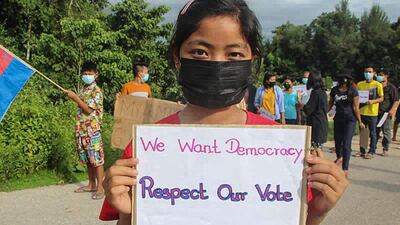The UN on Thursday said mass graves had been discovered in Myanmar and that the human rights situation is worsening as the world body edges towards acting to reverse the February 1 coup.
The UN office in Myanmar said it was “alarmed” by the “sharp deterioration” of the country since the junta seized power, spawning chaos and deadly clashes between the military and pro-democracy protesters as well as armed ethnic militias.
UN officials highlighted the reported burning by security forces of some 150 homes in the village of Kin Ma in the Magway region on Tuesday, which left two people dead and 1,000 others homeless.
They also pointed to the discovery of two mass graves in Myawaddy Township in Kayin state, which contained the remains of 25 people who had reportedly been detained last month by the Karen National Defense Organisation, an ethnic militia.
“The United Nations in Myanmar requires that those responsible for human rights abuses, including the perpetrators and their chain of command, be held accountable,” the statement said.
The officials also urged armed groups to limit harm to civilians, to avoid damaging homes and to avoid “collective punishments against communities, families or individuals”, which are illegal under international law.
Myanmar has been in turmoil since the junta seized power on February 1 and detained elected leader Aung San Suu Kyi and other senior members of her party, leading to daily protests and fighting between the armed forces and ethnic minority guerrilla forces.
Many UN diplomats have condemned the coup and the hundreds of civilian deaths that followed, but serious action by the Security Council has been opposed by China and some other Asian members of the 15-nation body.
The council will on Friday meet behind closed doors to discuss mediation efforts by the Association of South-East Asian Nations (Asean), a regional group that has been accused of shielding the junta from censure.




















The council is set to hear from Erywan Pehin Yusof, Brunei's second minister for foreign affairs and trade, who was one of two Asean envoys to meet Myanmar's junta leader Min Aung Hlaing this month.
Diplomats are also expected to hear from the UN special envoy to Myanmar, Christine Schraner Burgener, who recently returned from a long trip to the region, but without a stop in Myanmar, as the junta has barred her from entering.
Against the backdrop of gridlock in the council, the UN’s 193-nation General Assembly is also set to debate on Friday a resolution proposed by Liechtenstein calling on members to halt arms transfers to the junta.
Human Rights Watch and Amnesty International have pushed for a strongly worded General Assembly resolution to prompt the Security Council to impose a legally binding arms embargo.
“UN members should adopt and comply with it. Then [the] Security Council should follow suit,” Louis Charbonneau, UN director for Human Rights Watch, said on social media.
Myanmar's security forces have killed at least 862 people during their crackdown on protests since the coup, says the Assistance Association for Political Prisoners, an activist group, although the junta disputes the number.
The trial of Ms Suu Kyi began on Monday, with the court hearing evidence that she broke coronavirus restrictions during last year’s election and illegally imported and possessed walkie-talkies, her lawyer told reporters.


